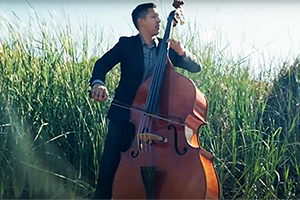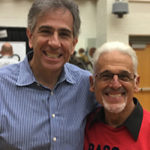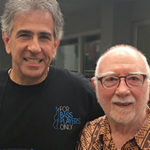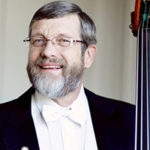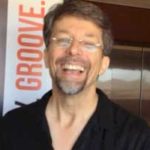Classically trained bassist carves out a niche in the pop world
Exclusive interview with FBPO’s Jon Liebman
June 15, 2020
Arizona native Nick Villalobos holds down the bass chair in the acclaimed string trio Simply Three, alongside cellist Zack Clark and violinist Glen McDaniel. With a repertoire that includes a mix of originals and pop covers, Simply Three’s popularity has grown exponentially via the group’s strong online presence and live performances. The band’s newest release, Better Days, was released May 1.
FBPO: How would you describe your musical upbringing?
NV: Very classically based.
FBPO: That would have been my guess!
NV: [Laughs] Pretty much strictly classical.
FBPO: Is that because that’s what your family was listening to? Parents, records, songs on the radio, concerts, things like that?
NV: Yeah, and it was basically how I was taught to learn the instrument. It was just through classical music, so naturally I was in orchestras, and playing the symphonies. I would then go home and listen to the symphony. It all just kind of worked itself in there.
FBPO: So bass was your first instrument?
NV: No, actually. My first instrument was the violin because my sister played violin.
FBPO: What made you gravitate to the bass?
NV: Well I started to not like the violin for whatever reason [Laughs]. I just started to hate it, to be honest. And I hated practicing, hated going to lessons. And then I went to a Phoenix Symphony concert. They had an “Instrument Petting Zoo,” they called it, in the lobby of Phoenix Symphony Hall, and that was the first place where I saw a bass. The “animals” were the instruments.
FBPO: Like a “Peter & the Wolf” kind of thing?
NV: Kind of, yeah. They had the principle players of each section out in the lobby with their instruments, and they said, “Hey, come and see the bass, come and see the violin.” So you get to go up close to the instrument, meet the musician, and they would talk about it.
FBPO: How old were you at the time?
NV: I think I was either 9 or 10.
FBPO: You started double bass lessons right around then? Right after that?
NV: Yeah, I begged my parents to let me play. I was going into 6th grade and, like most middle school orchestras, they needed bass players, so it was a good fit for me. Luckily enough, the school had an abundance of string basses, so they let me take one home.
FBPO: Did you go through the typical Simandl technique, and all that kind of stuff?
NV: I did. I was actually fortunate enough to start off my bass journey with the principle bass player of the Phoenix Symphony, who was the guy that showed me the bass at the Instrument Petting Zoo, so that was kind of an ironic thing that happened. My middle school teacher knew him, and so she said, “Hey, there’s this kid who’s really excited about bass. Do you have an opening?” Luckily he did.
FBPO: What was his name?
NV: Barry Olson.
FBPO: You said you “begged” your parents to get you a bass. Were they somewhat reluctant?
NV: Yeah. I think they started me on violin because they had a little violin. They bought violins for my sister, so I think they were just thinking, financially, it would be easier if I played the violin. They wouldn’t have to buy this other instrument. We weren’t poor by any means, but we didn’t have a lot of money to be buying instruments left and right. Not very many people do. Looking back on it, now that I’m an adult and I have a son and I have a mortgage to pay and all that stuff, I feel like I get it! [Laughs]
FBPO: Did you ever play electric bass?
NV: Not when I was younger. The first time I started electric bass was in college. That’s kind of a funny story too. I got called to play a Broadway gig. There was a musical going on in town and somebody called me. They said, “Hey, you play bass, right?” I said, “Yeah, I play bass.” They said, “You play electric bass too?” and I said, “Of course I do!” And I actually didn’t. I knew this was a gig and I wanted the money. So they said, “All right, we’re going to send you this book and there’s rehearsal next week” and I said, “Great!” And I called my buddy who I knew had an electric bass and I said, “Can I borrow your electric bass? I gotta learn this book.” [Laughs] That’s how I learned electric bass. I think it’s easier to transition. You’re already playing a certain type of bass. It’s not like I have to learn the strings or the notes. It’s kind of like a technique thing. It came pretty quickly.
FBPO: I know a couple of guys (Brian Bromberg and Steve Bailey) that started on upright and when they pick up the electric, to this day, when they get to the 12th fret or thereabouts, they go into thumb position. On the electric bass! Do you do that too?
NV: [Laughs] I did, I did. And then I talked to my buddy who plays electric bass really well and he was kind of like, “You don’t do that here.” He taught me some technique stuff, so it’s all good.
FBPO: How did that show go, by the way?
NV: It went well! It wasn’t too difficult of a book, so it was a good way to kind of jump into the waters.
FBPO: How did the concept of Simply Three come about?
NV: Simply Three started while I was in college at ASU. I’ve known the cellist in the group – his name is Zack Clark – I’ve known him since high school. He grew up in Arizona too and we’ve played in several different orchestras together. We’ve known each other for a long time and he had great passion for music, just like I did. Growing up, we’d talk about music all the time. He was also at ASU and we were talking like, “Man, it’d be fun to do something a little different with our instruments. When talking about music, we weren’t just talking about classical music. We were talking about our favorite bands too. We each grew up listening to the Beatles and we’d talk about the Beatles and our favorite albums and the amazing stuff they did with music, and the amazing things they did with their careers, and we thought, Man, it would be so cool to like, be a band! We love orchestras, and we love symphonies, but there’s something really cool about being a band. You know, traveling and doing your own shows. So how could we do that with our “classical” instruments, but still have a cool, hip factor to us? So we went to the Arizona State University music library and we got a Beatles book, a Beatles piano reduction book, and we just started to try to play it as a duet. How can we make this sound cool, just the two of us? And we found out very quickly that was very difficult [Laughs], so we thought, why don’t we add a third voice that can kind of take the melody as we do accompaniments, and vice versa. Why don’t we just get a violin. They’re very versatile instruments, they can get to a register that we can’t, so it’ll kind of open up our “sound field,” as one would say. And that’s kind of how it started. We just started playing things that we like, did a lot of Beatles arrangements, just because we knew that music, and it was kind of easy for us to jump in that way, with some music that we know, and it kind of just went from there.
FBPO: How did word begin to spread about the trio?
NV: We got a bunch of wedding gigs, which was very great for us as college students, to actually earn some money. Then at some of the weddings, people said, “Man, you guys sound great! Do you guys have a CD?” We’re like, “No. Should we get one?” They’re like, “Yeah, I would definitely buy it!” So we said, all right, let’s record some of this stuff. So we recorded our first album, Volume I. It was all covers. And then we started selling that. This was also the time when YouTube started kind of to get crazy and there were guys like Lindsey Sterling, and The Piano Guys, and 2Cellos, making music videos, kind of doing the same thing we were doing, playing popular music. So we said, we can do that. Let’s make a music video! We looked at their music videos, kind of studied them, and said, well, they do this, they have this aspect to their music videos, so maybe we could try that. So we just started making music videos. Then people started asking us, “When are you guys doing a concert?” So we figured out how to do concerts. It was all kind of “learnin’ from the streets,” as one would say, just learnin’ as we went. It’s been really fun.
FBPO: I would imagine you had some kind of tour in mind to promote your new record, Better Days, but in light of world events, that may have gotten changed. Did you have a tour planned?
NV: We were in talks, trying to get some dates together, but it all kind of went to crap [Laughs] because of the virus.
FBPO: Tell me about your gear. I know you’re a big fan of NS Design instruments.
NV: We went for years, studying what would be the ideal electric instruments for us. Because, especially when it comes to bass, I was thinking, what if I just played bass guitar for some of the stuff that we want to sound electric, ‘cause that’s easy. There’s tons of bass guitars we can (use to) make this work. Then I thought, let’s try to stay true to the instrument that I actually started playing, which is the stand-up. So I started looking at different stand-up basses. I really had a hard time finding a bass that sounded good while being bowed. That was the thing that was deterring me from really pulling the trigger, until I found NS Design. I heard some things on YouTube of people playing NS Design basses with the bow and it was the best sound that I could find. So I contacted NS and we actually did a little tour of their workshop in Maine and they sent us some instruments to try out before purchasing. I feel like Ned has come up with the best variation of pickups that make it sound good, with some pizzicato playing as well with the bow, so that’s kind of why I strayed towards them.
FBPO: Which model do you play?
NV: It’s their top model, the EUB.
FBPO: Four-string, right?
NV: I have a five-string, actually.
FBPO: Low B, I assume?
NV: I do a C.
FBPO: Really? You can’t assume anything anymore.
NV: I think the B would be cool. I should get a B, because I actually play in solo tuning, so from the bottom, I do C, and then F#, B, E, A. So it’s even weirder! [Laughs]
FBPO: I understand the fourths, but when you said “C” that kind of threw me. That’s your traditional, classical grounding! Most players today wouldn’t do that. You could say, “Well, the cello has a C,” but we’re not the cello, we’re the bass. And we’re tuned in fourths!
NV: [Laughs] Yeah, it is kind of confusing. Now that you say it, it would be cool to have a B. I think I’d like that. That would make more sense.
FBPO: What kind of strings do you use?
NV: I use Spirocores. That’s what I use on my acoustic instrument and they seem to work well.
FBPO: I think I noticed you’re a French bow player, correct?
NV: Yes, French bow.
FBPO: Most of our students at forbassplayersonly.com are electric bass players, but we do get some upright players too. What advice can you impart to someone who wants to learn bass?
NV: I would say, first and foremost, just learn the importance of good timing and rhythm because if the bass doesn’t feel good, if you’re not in that pocket, it doesn’t matter how good you are. You might be able to player faster than anybody else, but if you can’t do it in time, it’s not going to make any sense.
FBPO: It’s kind of refreshing to hear a classically trained musician speak of “the pocket.” You don’t normally hear that term from an orchestral musician.
NV: Oh, man, I can’t tell you how many times… Classical music doesn’t have that many syncopations. They’re not as abundant as in popular music, and some classical players cannot play a syncopated rhythm, for their life! And it’s really interesting because they can play things that are really, really hard, fast 16th-note passages all up and down the fingerboard. But if you give them a syncopated rhythm on two or three notes, they can’t do it very well. And so that’s what I mean by this feel of music. You gotta have the feel and timing of music, or else, to me, it really isn’t music. It doesn’t groove. It doesn’t feel good. You gotta have that rhythm. As classical players, we don’t really focus on that. We focus on the intonation and articulation, but it’s just that groove, man. You gotta have that.
FBPO: What else do you have coming up outside of maybe a would-be tour? What else would you like to do that you haven’t already accomplished?
NV: Well, obviously like you said, the touring is lacking. That’s really the main reason Zack and I started this, because we wanted to do live shows. I think that is the ultimate satisfaction for any musician. I don’t want to speak for all musicians, but for me it’s about preparing the material and getting in front of people and playing it. That is the reward. It’s exhilarating. It’s exciting. It’s exciting being onstage and knowing, “Man, I have one shot to hit this lick,” and then you hit it, people go crazy and they’re like, “Wow, it’s amazing!” That is exhilarating. So, we’re obviously looking forward to doing that but as far as right now, what’s next for us on the horizon that’s realistic, we’re going to continue to record music. We got our own little studio where we record music all the time. What’s been great during this pandemic – I’m looking for the silver lining – is that we’ve had time to be in the studio every single day, which has been very nice. We’ve been able to lay down a lot of different tracks. We actually just got done recording four different music videos that will be coming out very soon, so I think our presence on social media and the Internet has actually been kicked up quite a bit because we’re not focusing on the live shows, which, like I said, we would like to only focus on. But especially in this world today of the Internet, you’ve gotta kind of nurture both. You cannot not have an Internet presence, so we’re trying our best.
FBPO: What would you be if you weren’t a bass player?
NV: My first love, just in general, was sports. I love basketball. When I was really young, I loved the Phoenix Suns and I wanted to be in the NBA. When I realized I wasn’t going to be above six foot, I realized that it was going to be very hard for me to be in the NBA. I still love basketball, but I kind of let go of that dream.
FBPO: Didn’t Steve Nash play for the Suns?
NV: He did!
FBPO: Well, he’s not very tall.
NV: But he’s way better at basketball than I ever was! After that, I really wanted to be a fighter pilot. I love planes and I love the military aspect of things. I think if I was to live another life, and have the same body, I’d try to be a fighter pilot or be some sort of Special Forces type thing because I just think those guys are like the coolest.
See Jon’s blog, with key takeaways from this interview, here.
Better Days is available here:
